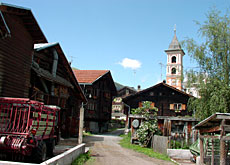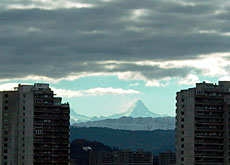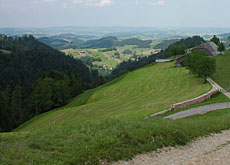Alpine cultural identity under attack

The cultural identity of Switzerland's Alpine regions is facing extinction, according to a leading expert.
While some areas are being badly affected by depopulation, others are being swallowed up by ever-expanding urban centres.
Werner Bätzing, professor of cultural geography at Germany’s University of Erlangen-Nuremberg, claims the survival of the Alps as a populated landscape with an identity of its own is at stake.
According to Bätzing, recent decades have seen metropolises such as Zurich, Munich and Turin steadily sucking in areas on the margins of the mountain chain.
Eighteen per cent of the Alpine population now commute to work. Alpine towns, such as Bolzano, Trento, Klagenfurt, Innsbruck, Chur, Vaduz and Grenoble, are increasingly tied to metropolitan areas.
Other regions within the Alps are facing economic meltdown. The only exceptions are a few tourist resorts.
In demographic terms, this leads to a concentration of population in the main valleys, while many side valleys become depopulated.
Difficult process
Bätzing is convinced the process can be checked, but he fears the demographic and structural changes under way will take a lot of stopping.
“Cities and urban areas in the Alps must consciously acknowledge their responsibilities to the surrounding alpine environment, instead of seeking links with the metropolises,” he says.
“They should also collaborate more closely among themselves”.
Initiatives with this focus already exist. One such is “Alpine Town of the Year”, a title awarded each year to a locality that has distinguished itself with projects aimed at reinforcing the region’s identity.
In 2003, the award went for the first time to a Swiss town, Herisau.
“A focal point of the initiative is that the town should reinforce relationships with the surrounding territory,” notes Bätzing.
New awareness
A further example of the new awareness comes from the “Alpine towns” workgroup, founded in 1988.
Twenty-six urban centres belong to the group, including the Swiss towns of Bellinzona, Locarno and St Moritz.
“Sadly, there are also negative examples,” adds Bätzing.
“In 2000, the cantons of Graubünden and Glarus decided to intensify their collaboration with Zurich, turning their backs, in a certain sense, on the neighbouring Alpine regions.”
Depopulation
Nevertheless, Bätzing believes that it is important for regions affected by depopulation to develop a series of decentralised economic and cultural stimuli, “so that the Alps will be conserved as an economic and life space”.
Bätzing sees further exciting development prospects in tourism, highlighting the “Via Alpina” (Alpine Way), a hiking trail traversing the entire Alpine range:
“It is a fine example of how to promote socially and ecologically compatible tourism that is structurally decentralised yet still covers the entire Alpine chain.”
If anything is missing, says Bätzing, it is the cross-border co-ordination of these various initiatives.
“It is extremely important that all these initiatives should liaise with each other. This is the only way for them to grow stronger.”
swissinfo, Andrea Tognina
A German geography professor is warning that the Alps’ cultural identity is under threat.
Werner Bätzing of the University of Erlangen-Nuremberg says that areas on the margins of the Alps are increasingly tied to metropolitain areas.
Populations are concentrating in the Alps’ main valleys as more and more people commute to work, and side valleys are becoming depopulated.
Bätzing says that to preserve the Alps as an economic entity, cities and urban areas must recognise their responsibilities and develop a series of decentralised economic and cultural stimuli.

In compliance with the JTI standards
More: SWI swissinfo.ch certified by the Journalism Trust Initiative



You can find an overview of ongoing debates with our journalists here . Please join us!
If you want to start a conversation about a topic raised in this article or want to report factual errors, email us at english@swissinfo.ch.